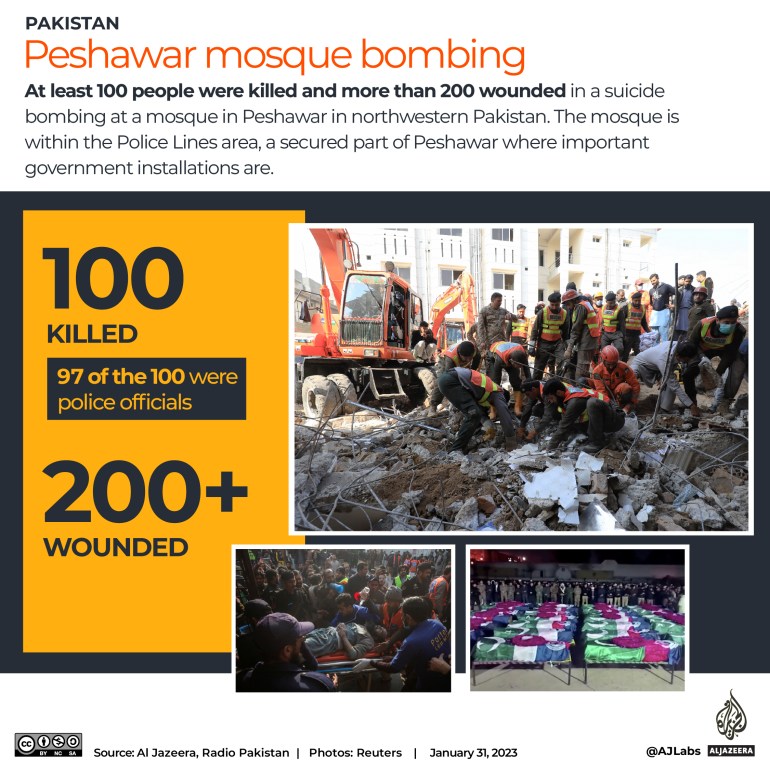The blast on Monday targeted worshippers during the afternoon prayer at a mosque inside the northwestern city’s highly fortified police compound. The attack killed at least 101 people, most of them policemen.
Authorities have launched “thorough investigations” to find out how the attacker entered the highly secured Police Lines area and if the bomber had inside help in carrying out the attack. On Tuesday, police said they made “major” arrests but gave no details.
During a news conference, Moazzam Jah, inspector general of police in Khyber Pakhtunkhwa province, acknowledged there was a clear “security breach” in the provincial capital despite multiple checkpoints.
“But we also have 1,500 to 2,000 people coming in and out of Police Lines daily,” Jah said. “They include police officials, general complainants, and families and relatives of those officers who reside inside the compound.”
About 4,000 to 5,000 people live inside the compound.
A commander of the Tehreek-e-Taliban Pakistan (TTP) armed group aimed responsibility for the attack, but a TTP spokesman later denied a role in the blast.
At least 17 people have reportedly been killed and dozens injured after a bomb blast at a busy mosque in Pakistan’s Peshawar, say local officials ⤵️
🔗: https://t.co/R5q74scIjW pic.twitter.com/YWynAHGu00
— Al Jazeera English (@AJEnglish) January 30, 2023
Police Lines is where government buildings are located, including the governor’s house, central jail, provincial assembly, provincial high court and Peshawar Corp Commander House. People entering the area have to pass through three checkpoints, and no one is allowed in without an invitation from residents.
A police official at Police Lines expressed surprise at the security breach.
“It is very difficult to gain entry amid tight security checks,” Amanat Ali, 44, told Al Jazeera. “However, some construction work has been going on in the compound, so civilian labourers have been coming here.”
Another police constable, Imran Khan, who lives in the compound, said it is not easy to bring in family members due to the tight security.
“We have to inform beforehand, and even then, they go through lot of checking before anybody is let in,” he said.
Akhtar Ali Shah, a security analyst and former Khyber Pakhtunkhwa inspector general of police, said despite being a former top official, he has never been allowed to pass through without inspections.
“Whether I visit impromptu or through an invite, I have had to show my complete details,” he told Al Jazeera. “The process is even more strict for strangers or the public.”

Shah said he saw three ways the bomber could have entered the fortified area.
“It is possible that there was somebody from the police who turned rogue and joined militant elements,” he said. “Another is that somebody who was formerly with the police quit the service and then became part of the group wanting to create terror.”
Shah added that the third possibility was that somebody from outside befriended a resident and became a regular visitor or stayed there.
Shah also said the explosives must have been brought in over time and not all at once, something his successor Jah alluded to in his news conference.
“These perpetrators know how to build these improvised devices,” the Peshawar-based analyst said. “This is what they are trained for. So the person didn’t have to bring explosives or ball bearings or other equipment to build in one go. He must have brought all the parts in gradually.”
Shah pointed out the absence of a scanning device at the entrance that could have potentially detected explosive material.
“I did not see any scanning device at the gate,” he said. “But what also needs to be inspected is if there were sniffer dogs deployed or not. I set up the canine unit for this very purpose many years ago, which remain the most reliable way to detect.”
